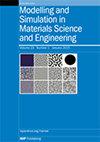A coupled crystal inelasticity-phase field model for crack growth in polycrystalline nitinol microstructures
IF 2.4
4区 材料科学
Q3 MATERIALS SCIENCE, MULTIDISCIPLINARY
Modelling and Simulation in Materials Science and Engineering
Pub Date : 2024-08-27
DOI:10.1088/1361-651x/ad6fbf
引用次数: 0
Abstract
This paper introduces a comprehensive computational framework, comprising a finite deformation crystal inelasticity constitutive model and phase field model, for modeling crack growth in superelastic nitinol polycrystalline microstructures. The crystal inelasticity model represents crystal stretching and lattice rotation from elastic mechanisms, as well as local inelastic deformation due to austenite-martensite phase transformation. The phase field formulation decomposes the Helmholtz free energy density into stored elastic energy, phase transformation energy, and crack surface energy components. The elastic energy accounts for tension-compression asymmetry with the formation of the crack through a spectral decomposition. Kinetic Monte Carlo simulations generate equilibrium area fractions of different surface orientations, which serve as weights for the surface energy. An adaptive wavelet-enhanced hierarchical finite element (FE) model is introduced to alleviate high computational overhead in phase field crack simulations. Simulations with the coupled inelasticity phase field model are conducted under various loading conditions including Mode-I tension, a quasi-static Kalthoff experiment, and cyclic loading of polycrystalline microstructures. Crack propagation is effectively predicted by this model, providing valuable insights into the material mechanical behavior with growing cracks.多晶镍钛诺微结构裂纹生长的晶体非弹性-相场耦合模型
本文介绍了一种综合计算框架,包括有限变形晶体非弹性结构模型和相场模型,用于模拟超弹性镍钛诺多晶微结构中的裂纹生长。晶体非弹性模型表示了弹性机制引起的晶体拉伸和晶格旋转,以及奥氏体-马氏体相变引起的局部非弹性变形。相场公式将亥姆霍兹自由能密度分解为储存的弹性能、相变能和裂纹表面能。弹性能通过频谱分解反映了裂纹形成时拉伸与压缩的不对称。动力学蒙特卡洛模拟产生了不同表面取向的平衡面积分数,作为表面能的权重。引入了自适应小波增强分层有限元(FE)模型,以减轻相场裂纹模拟的高计算开销。利用耦合非弹性相场模型在各种加载条件下进行了模拟,包括模式 I 拉伸、准静态 Kalthoff 实验以及多晶微结构的循环加载。该模型有效地预测了裂纹的扩展,为了解材料在裂纹扩展时的机械行为提供了宝贵的见解。
本文章由计算机程序翻译,如有差异,请以英文原文为准。
求助全文
约1分钟内获得全文
求助全文
来源期刊
CiteScore
3.30
自引率
5.60%
发文量
96
审稿时长
1.7 months
期刊介绍:
Serving the multidisciplinary materials community, the journal aims to publish new research work that advances the understanding and prediction of material behaviour at scales from atomistic to macroscopic through modelling and simulation.
Subject coverage:
Modelling and/or simulation across materials science that emphasizes fundamental materials issues advancing the understanding and prediction of material behaviour. Interdisciplinary research that tackles challenging and complex materials problems where the governing phenomena may span different scales of materials behaviour, with an emphasis on the development of quantitative approaches to explain and predict experimental observations. Material processing that advances the fundamental materials science and engineering underpinning the connection between processing and properties. Covering all classes of materials, and mechanical, microstructural, electronic, chemical, biological, and optical properties.

 求助内容:
求助内容: 应助结果提醒方式:
应助结果提醒方式:


